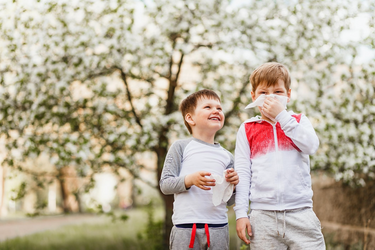How to Alleviate Your Kids’ Allergies
Posted by Eileen O'Shanassy on 21st Nov 2019
There can be a variety of symptoms associated with children's allergies. Sneezing, coughing, wheezing, and itching are just a few allergy symptoms that can cause a considerable amount of misery for a child. Fortunately, there are a few things you can do to minimize the effect your child's allergies have on them.
Avoid Allergy Triggers
Things like dust, pollen, and animal hair are known triggers for children's allergies. If you can identify one of these or pinpoint another allergen that is responsible for the symptoms your child experiences, you can take measures to help your child stay away from those things. If your child is affected by pollen or another outdoor allergen, more indoor playdates may be the answer. Do your best to avoid peak pollen hours if it is necessary for your child to go outside. A brimmed hat and sunglasses will help to keep pollen out of your child's hair and eyes. Indoors, dust mites like to hide in beds, so make sure your child's bed is clear of these allergens. According to Anna Bella Bedding, studies have shown that microfiber materials can reduce exposure to allergens and dust mites, so keep that in mind when you're choosing bedding for your child.
Use Medications
Medicine will not cure your child's allergies, but it can provide them with relief from allergy symptoms. Allergic reactions cause the body to release the chemical histamine. This chemical is responsible for stuffy and runny noses. Histamine also causes the eyes to itch and water. Antihistamines, as the name suggests, are medicines that block the release of histamines. These medicines are usually the first ones used by allergy sufferers. According to National Jewish Health, antihistamines can be very helpful for children who are chronic allergy sufferers. Nasal sprays and prescription eye drops are available when antihistamines will not do the trick.
Stay Hydrated
Constant sneezing and nose blowing can leave your child a little dehydrated. Drinking enough water to support healthy bodily functions is always important, and according to Doulton, you should encourage your child to drink a little more water than usual during allergy season. Not doing so can cause an unpleasant cycle to begin as allergies worsen when fluid levels are low.
Allergy season is no fun for many children. Fortunately, there are measures such as these that you can take to bring relief to your child when allergies have them feeling a bit under the weather.
Planning on spending some time with your kids outside this fall? Try taking them to these places in your Piggyback Rider!

